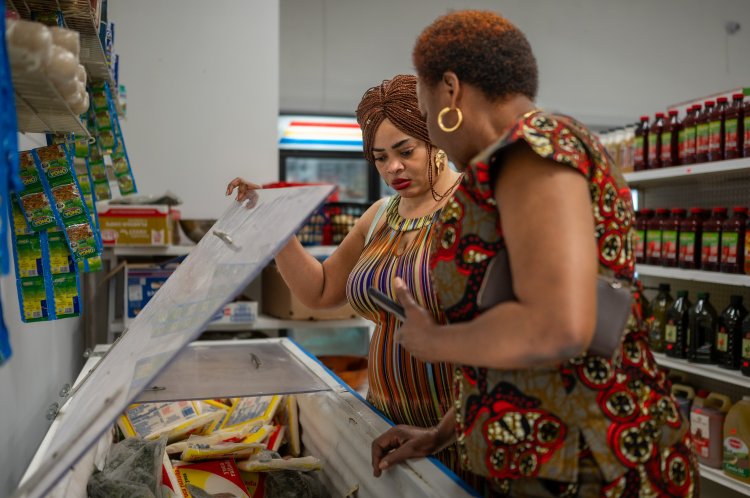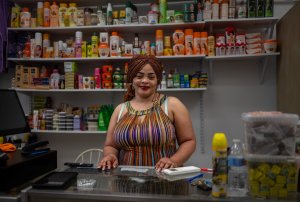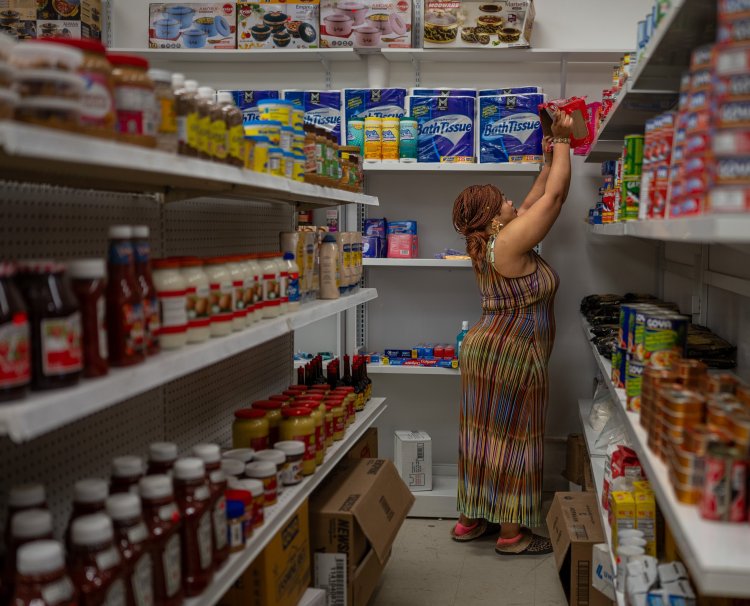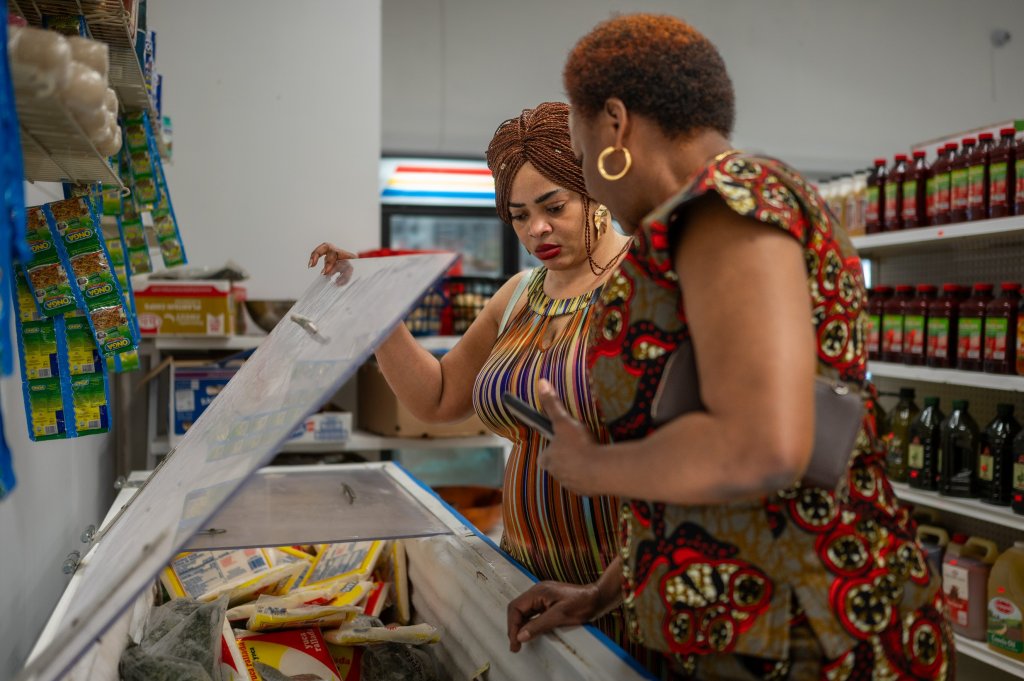

Alice Ntsame, left, serves a customer at her Zion Shop and Service store on Lisbon Street in Lewiston on June 26. The customer came to look for ingredients for a large meal of vegetables, meat and fish. Andre Kane / Sun Journal
Maine’s beautiful, vast countryside is why so many of us call this state home. But not being able to drive or not owning a car can make it extremely difficult to access work, education, and basic services, especially in places with limited public transportation. This poses major challenges for asylum seekers arriving in Maine.


Alice Ntsame stands behind the counter at her store, Zion Shop and Service, on Lisbon Street in Lewiston on June 26. Ntsame speaks six languages to serve her international customers, some of which she speaks “just a little bit.” Andre Kane/Sun Journal
Think about it: applying for asylum and getting a driver’s license can take months, and you likely can’t even afford a car until you get a job, which requires a work permit, which you can’t apply for until 150 days after applying for asylum, and then you have to wait another few months for it to be approved.


Heritier Nosso
If they can’t work or drive, their independence is delayed, and they can’t afford or access food or other important services.
There are two bills in Congress that would expedite the work authorization process for newcomers, including one from U.S. Representative Chellie Pingree, which would significantly reduce the time it takes for asylum seekers and other immigrants to become independent. In the meantime, I’m proud of my friend, New Maine native, Alice Ntsame, and the work she’s doing to address some of these issues.
Alice and her family, who came to Lewiston from their native Gabon in 2016 and applied for political asylum, struggled with transportation and therefore difficulty adjusting. They took taxis when they could find one and afford it, which was rare. Her nieces, who came with them, were able to take the bus to school, but Alice says they had to rely on neighbors who had cars to get them to the bakery where she worked. Coordinating daily trips was stressful and she worried it would be a burden. Still, people in the community stepped up to help in their time of need, and Alice has not forgotten their generosity.
A year ago, Alice opened Syon Shop and Services in Lewiston. She sells groceries and products that cater to the needs of Maine’s sub-Saharan African population, such as cassava flour, smoked mungus/Njombo fish, and African leafy vegetables. The best part is that she and her staff offer a free delivery service, making food shopping easy for everyone. She says it’s her way of giving back to the community.
With services like Instacart and Doordash available, a simple grocery delivery may not seem like a big deal. But what Alice does is much more meaningful than that. The products she stocks aren’t readily available elsewhere in the state, and they provide much-needed solace for those who miss traditional African food and dress. It also gives Alice’s customers a connection to the local community; they flock to her store and get to know their neighbors, both foreign-born and native Maine.
When I crave my favorite Congolese dishes like fufu (a starchy side dish) or ntaba (goat meat), it’s important to know where I can buy culturally appropriate ingredients. Eating foods that remind me of home makes my wife and I feel closer to our nostalgic relatives.
The delivery service began a few months after the store opened. Alice noticed that many customers traveled an hour from towns like Portland and Brunswick to shop at the Lewiston store. The heavy shopping bags were a burden for customers to walk home or carry on public transportation. As a result, customers stopped by the store less frequently and chose not to buy the items they really needed.
She and her husband, whom she married last year, or one of her employees would drive those customers home, making sure they had everything they needed in one trip. “They really helped me out when I came here,” she said. “It makes me happy to be able to give back to other people.”


Alice Ntsame organizes shelves at her store, Zion Shop and Service, on Lisbon Street in Lewiston, on June 26. Ntsame carries a variety of local and international products to cater to her mostly international customer base. She also offers a delivery service for customers who don’t drive. Andre Kane / Sun Journal
The gift of independence that Alice gives to newcomers will no doubt set them up for success. She is proof of that: She got her first job, eventually got her own car, and was able to save enough money to buy a home for herself and her niece in 2020.
Her oldest daughter will be attending college in Bangor in the fall, and her youngest is doing well academically as well. Now, after just a year as a business owner, Alice and her husband hope to expand by opening a second store in Brunswick. She’s also putting the business degree she earned in Gabon to good use, going back to school to become a business coach and help other immigrants achieve their dreams of becoming entrepreneurs.
I’m proud of Alice and our lawmakers for working to help newcomers become independent more quickly. Of course, she also provides great services and products that all Mainers can enjoy. Be sure to check out her shop and say hello if you see me there!
“Conversations with New Mainers” is an occasional column that focuses on the challenges facing newcomers to Maine. Heritier Nosso is a health promotion coordinator and community organizer in Lewiston.
Copy story link
” previous
Worst day ever for Auburn and Lewiston public safety officers
Next ”
Auburn University arson and shootout turn Maine public defender crisis into accountability forum
Related article



